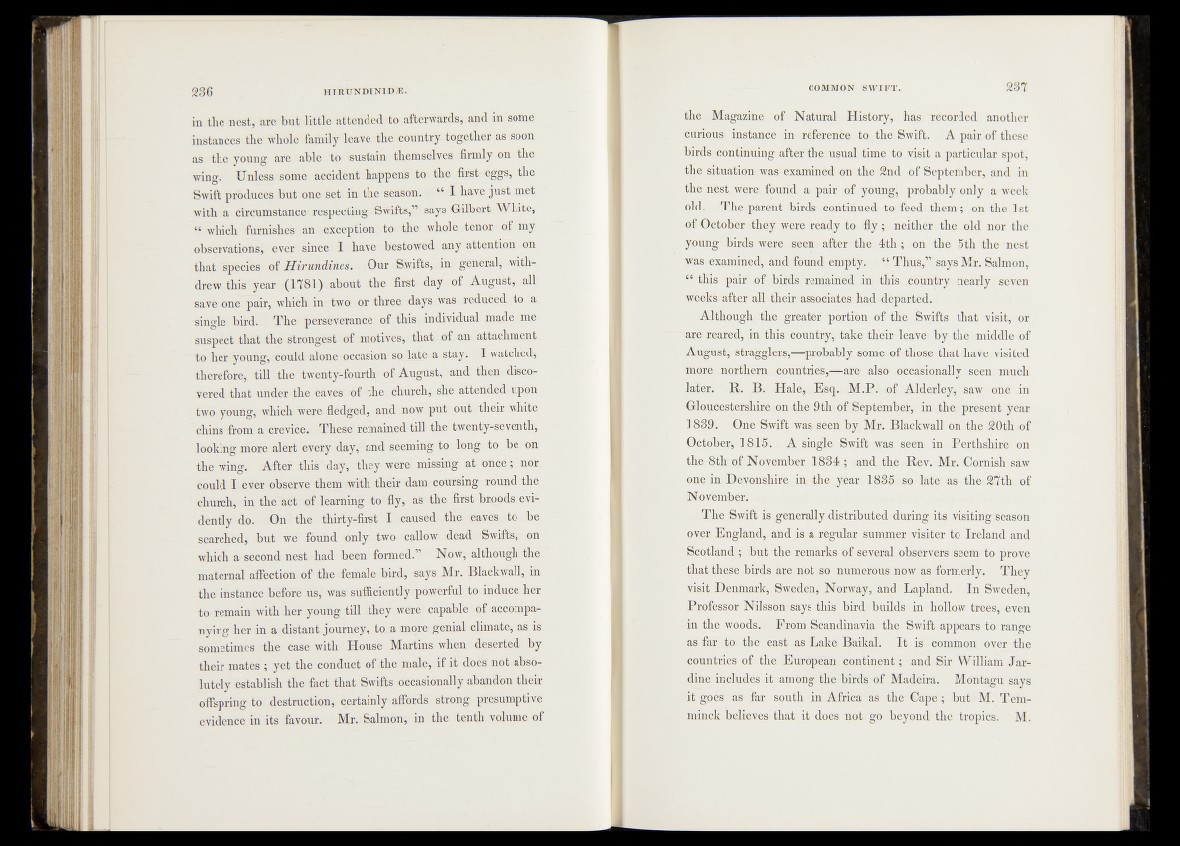
in the-nest* are b u t little attendedTo afterwards, and in-some
instances the whole'family leave the countryTogether.gSiSeoii
as the young are able to sustain themselves'firmly ®n the
wing. Unless some accidentihappens to the first-eggs, the
Swift produces b u to n e s e t in the season. - i( I h a ^ g u st met
with a circumstance - respecting. Swifts,$£siays Gilbert Whites*
i( which furnisheg'^ an exception the whole tenorv^qf my
observations, ever' since: I have".bestowed- any^athen^n v®n
that species of Hirundines. > Our Swifts, in, general', with-,,
drew this year (1781 }iabout-the first dayft<#^August, ■ all
save one pair, which in two__or three days,1 was reduced. to,ta^v
singles bird. - The persèverance of i^this individual- mad^nia
suspect- that the. strongest of motives-, thaWd/an a^t^kiiemt.
To her- young,jcould alone occasion soJèrtQya^S^#-.
therefore, till the twentyTourth of August, - and fKéuidiseo--
vered that under the, eaves' of .thé eMftb, she utténtfed-upOn
two young,- which were-fledged, and now put; out white
phins-from a crevice. These’ remainedtiE the twenty -m \i nth*
looking msre alert every -day^and seeming'to lpi$gj:
the wing. Aftef _thisvday, they were'-missing a1$j8%«K> nor.
should I ever observe them with their dam coursing roundithe g
chureh, in theTact 'of .learning tot fly, *as.- theififstr breads ewh
dently do. On “the thirty-first I jcafo^cdSestho, -,©®^esyto^bc
searched* ibut we found? w ly two - callows dead Swifts, s©n
which a second nest had been fo rm e d ^ 'Now, although^!}!)!©
maternal affection of theTemale Mrd, -Says Mr. Blackwall, in
the instance before us* Was sufficiency powerful to induce her
to remain with h e r young till ïfey-.weré capable of accompanying
her in a distanbyourney, t&_a more genial climate, as is
sometimes the case with House Martins when deserted’ by
their mates; yet the conduct of the male, if it dqésJnot absolutely
establish the.faet that Swifts-occasionally abandon-Jheir
offspring to destruction, certainly-affords strong presumptive
evidence in its favour. \ Mr. Salmon,- in the.-Tenth-volume of
the Magazine, of - Natural History, has recorded another
curious- instance injreference tQ; the. Swift* A pair of these
birds fe n tin u i^ a fte r the u^ual time to visit a particular spot,
'^hd^si-tnation waseXamihed on fheJind ■ of September, and in
^hgfaicst; v«a -pair ©ftyèungt probably only a week
p l% - The^j parent birdf?”# continued^ tprfeed th em ;'o n the 1st
lif l^ tp b e rT h ^ ^ p I r e a d y to. fly-^neither. the4old nor the
were ^ h ^ ra ftc rith e 4th ;&©p the 5th the nest
was*examined, J'^prohiis,’! says Mr. Salmon*
“ this pair of birds remained this ^country nearly; seven
Wéeksfafter all theifpasseciatesihad departed..'
Although the greater ^portioni'Mithe Swift's that visit, or
ï^p rearedj in this - county, take thpir leave by the middle of
August,»ssfragglers,!—probably some .of, tJioaeThat have visited
more northerm;,cpuntia©^,—ate also .occasionally seen much
laftgfa R. JB,. Hale.,. Esq. M.P.? o f Alderley,. saw one in
'^lo^esftrshire? dpftbt Qth of .September,- in The>rpresent year
1 8 3 ^ ^‘© n e t^ ift -wasteen? by Mr. Blackwall on th é 20th ,of
f^é'tffber, 1,8fl single Swift-was seen,in Perthshire s on
th ^ ith s n ftN o ^m ft^ l8 3 4 ; :and thé-fRev. Mr. Cornish saw
-©.Ef‘%!fH;ei^hshire,^in fthe^year 1835 so late,-as the 27th of
Nip^jember.
.. The-Sïwift is .generally distributed during1 its visiting season?
j^yër, England, and is- a regular summer.' visiter to Ireland and
i^cotland^. but the remarks of Several observers seem to prove
that these .birds^hre- not somiimerpus now as formerly. They
visit Denmark, Sweden,. Norway, and Lapland. In Sweden,
Professor Nilssbn- saysThis-ibird builds'in hollow trees, even
in the woods. From Scandinavia the; Swift appears to range
as far to the-easbias Lake Baikal; . I t is common over the
countries of the European continent; - and Sir William Jar-
dihe includes it; among the birds o£ Madeira. Montagu Says
it goes ..as far south in Africa as the Cape; but M. Tem-
minck believes that it does, not,go beyond the tropics. M.